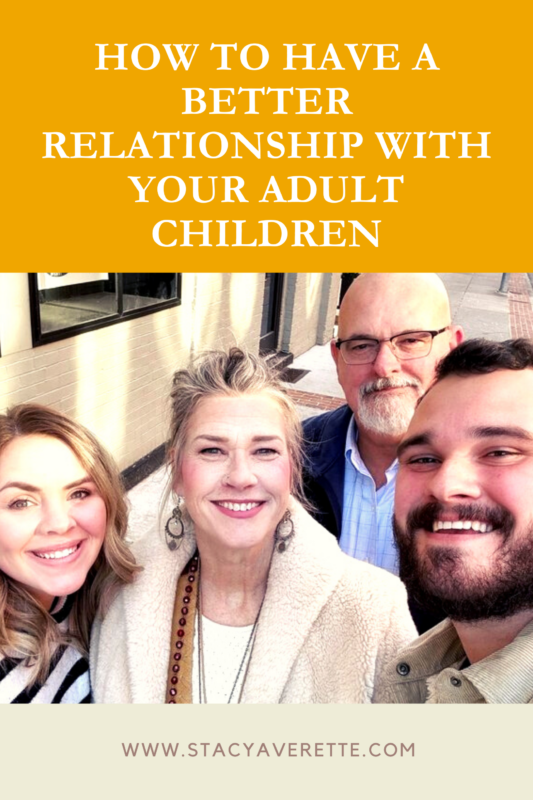Last Updated on February 20, 2024 by Stacy Averette
You’ve survived the terrible twos, middle school, and adolescent angst. Now all your babies are grown. Surely, parenting adult children is going to be a cakewalk! But new seasons of life always bring new challenges and the need for change!
If you’re struggling in your relationship with your adult children or you just want to make a good relationship even better, I think I can help! (AKA: here are a few things I learned the hard way!)
As parents, our instinct is to teach, care for, and protect our children. We love them beyond words and would give them anything money can buy. We’d even sacrifice our own life if necessary. We want to see them grow up to be healthy, happy, thriving adults so we do our best to teach them everything we think they need to know before they launch into adulthood. But time goes by so fast.
One of the hardest parts of parenting is letting go when it’s time. I think there are two big reasons for our fear and sadness.
- We fear we’ve failed to prepare them for life adequately. There’s so much to teach and so little time! The truth is mom/dad of adult children: You did the best you could with what you knew at the time you were raising your kids. We’re all humans being human and we make mistakes. After all, most of us are still learning to be an adult ourselves! I grieve my many mistakes as a mom and wish I could go back and do some things differently with my children but I can’t. All we can do is acknowledge our failures, apologize for our mistakes, and keep on living and learning.
- We know we’re going to miss them when they’re gone. Our goal is to help them grow into their own independent life but change is hard and we like feeling needed and useful. The empty nest can feel painfully empty.
But if we aren’t careful, our fear and insecurity may cause us to adopt some unhealthy habits that inhibit their growth and damage our relationship with them. The parent-child relationship is one of the most important relationships we will have, so we want to do our part to make it the best it can be. If you want to have a better relationship with your adult children, break these six bad habits.
1. Stop giving unsolicited advice to your adult children
-
- How they dress or wear their hair
- How they manage money
- How they manage time
- How they keep their house/apartment/dorm room
- How they parent
We all bristle when well-meaning friends and family give unsolicited advice and your adult children are no different. Yes, I know you’re just trying to help but stop! Unsolicited advice feels disrespectful and condescending. Life is hard and in every season we’re all trying our best to figure out who we are and what we want to be when we grow up! We all make mistakes (and are hopefully learning from them) but making mistakes simply means we’re human.
Benefit: If you stop giving unsolicited advice you might find that they ask your opinion more often!
2. Stop with the twenty-question routine.
-
- Have you filed your taxes yet?
- Did you remember to call ___________?
- What did you do about _____________?
- Have you been to church lately?
- When was the last time you read your Bible?
- When was the last time you called your grandmother?
- When are you coming for a visit?
- Why can’t you stay longer?
- Are you saving any money?
- Did you make a doctor’s appointment yet?
We care about our children and want to help them in every way we can but it’s not our job to run (control) their life. Remind yourself that you’ve taught them as best you could and that there are some things they’ll have to learn the hard way (like you did). And remember, their mistakes are not a perfect reflection of your parenting. Don’t let your ego get in the way of loving them as they learn! Adulting is hard at any age. They likely feel overwhelmed and afraid by it all and more questions only add to their anxiety. Voice your confidence in them. Let them know that you know that life is hard. Don’t make them earn your love and acceptance. Tell them they’re doing great and you’re proud of them!
Benefit: They may share with you how they’re struggling, ways they’ve failed, and things they’ve forgotten to do if they know you believe in them and they feel loved and safe with you.

3. Stop complaining about your adult children
-
- They never call or visit.
- Their house is a mess!
- They just let their kids eat whatever and watch whatever!
- All they ever do is eat out!
- They can stay at the ballpark all day but can’t come to church on Sunday!
Your adult children will make mistakes. Sometimes they’ll make different choices than you’ve made (not always mistakes). It’s normal to feel disappointed, worried, and frustrated at times. It’s also completely acceptable to have someone— a close friend and godly confidante or a professional counselor—that you talk to and process your feelings.
But constantly complaining about your adult children to anyone and everyone is unhealthy for you and ultimately hurtful to your relationship.
Think and speak the best about them. Be gracious about them, especially in their absence. Pray for them. Trust that God is at work in their life just like yours!
Benefit: You’ll build trust with them and strengthen your relationship.
4. Stop criticizing the people in your adult children’s life
- Their friends
- Their spouse
- Their boyfriend/girlfriend
- Their boss/coworker
- Their pastor
Dear parent, your adult children will have people they love and care about and respect. You may not feel the same way about those people but being critical of them to your children will undermine your relationship. (They probably don’t like all of your people either!)
Be kind. Make an effort to get to know the people they care about and try to find out why they care about the person or what they like about them.
Benefit: You may meet and get to know some fun and interesting people through your children that you otherwise would never have met.
5. Stop trying to one-up their story
When your children share their lives with you, the successes and hardships, let go of the need to tell your story. We all joke about the person who had to “walk five miles uphill in the snow to school” but if we aren’t careful we can become her.
-
- When I was your age . . .
- When I got married . . .
- When I was pregnant . . .
- When y’all were little . . .
There may come a time when it’s appropriate to tell your story but be patient. When you sense the time is right, tell your story in a way that encourages, gives hope, and testifies to the goodness and faithfulness of God. Don’t dismiss or diminish their struggles or accomplishments by putting the focus on yourself.
Benefit: They’ll grow in godly confidence and humility as they face their successes and failures.
6. Stop living vicariously through your adult children
Your adult children have a life of their own. You modeled and taught them to work, play, and enjoy time with family and friends. Let them do their thing and be their own person.
-
- Respect their schedules
- Respect their boundaries
- Respect their privacy
One of the easiest ways to do this as an empty nest mom or dad is to get a life of your own! Have a schedule of your own and have healthy boundaries. Don’t sit around and wait for them (or anyone) to enjoy your life.
I would prefer to spend some time with each of my children on their actual birthday but that’s just not feasible. Holidays are a challenge especially when they’re married and have other families to visit. Their work schedules and social calendars are always changing. Don’t take it personally, guilt-trip them, or punish them by withholding love. Let go of all bitterness and resentment.
Be kind and understanding. Offer options and be creative about spending time together. Model sacrificial love and forgiveness. Focus on living your abundant life in Christ.
Benefit: They’ll learn what being a healthy, happy adult looks like by your example.
Being a parent is a privilege and responsibility. How kind of God to give us children and allow us to raise them in the nurture and admonition of the Lord. Our roles and responsibilities change as we move into adulthood but the parent-child relationship can never be undone.
Parenting requires faith, humility, and a lot of sacrifice in every season. At times, it can seem like your work is unfruitful, unappreciated, and unrewarded as you see your children leave your nest and fly happily into adulthood without you.

But remember: The all-knowing, all-powerful, and ever-present God is near. They are not alone and neither are you! Rest in that.
Before you go, I wonder if you’d be willing to add to the six things I shared. Did I miss anything? Leave a comment and share what you’ve learned as a parent or as an adult child.
Thanks for stopping by! Next week I’m going to share six simple ways to bless your adult children and let them know you care.


Very nice writing. Still I feel in my mind a huge emptiness for my only son rather only child when he does not respond properly.
But it is ok.
I actually want to forget him because I am not needed to him.
I have 7 children, but the 2 oldest have left the nest. I am finding that I enjoy them in this stage. It is interesting to see how different generations make choices. It’s also surprisingly funny that those adult children are surprised that the rest of us have adventures without them. And we remind them that we parents had a life before we had them and plan to enjoy life after they have flown the nest.
Melanie, I love your thoughts and your perspective. What a great reminder! Thanks for stopping by and reading the post.
Thank you for this. I have a 20 and a 21 year old. As I try to navigate this stage of life I am making many mistakes. I will be bookmarking this article.
Enjoyed this article on the 6 habits that will bless our children !I will share with friends.
Thank you so. I like the way you write, think.
I’m so glad you enjoyed the post. Thank you for sharing!